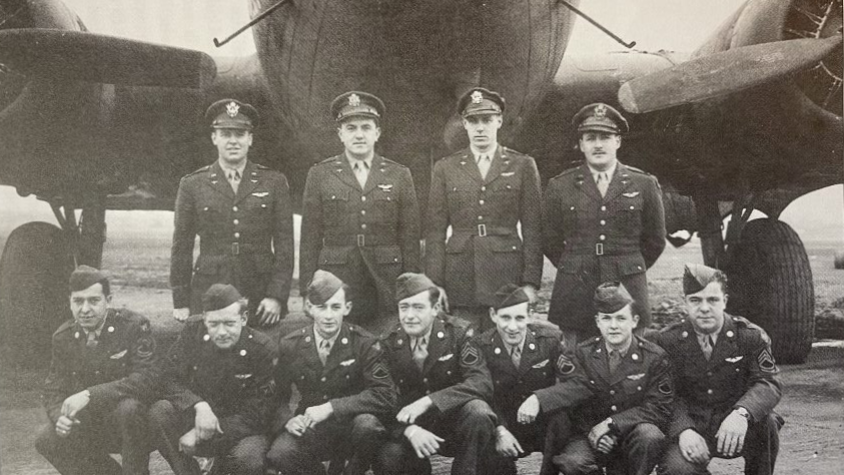Dad is just one hero on this Memorial Day
May 29, 2022, 11:35 AM | Updated: May 29, 2023, 11:14 am

My father (back row, second from the left) with his squadron. (Photo courtesy "A Dying Breed" by Neal Dillon)
(Photo courtesy "A Dying Breed" by Neal Dillon)
Dad was a war hero.
He served in the Eighth Air Force.
A book was written about him and his squadron, A Dying Breed: The Courage of the Mighty Eighth Air Force, by Neal B. Dillon, was the only way I knew about his service.
He died more than 50 years ago.
As Dillon wrote, “World War II Army Air Corps flyers were an elite group, all young volunteers, specially recruited and trained to perform highly skilled combat jobs.”
Pilots “fought a type of war in the air that the world has never experienced and would likely never see again,” he continued.
Biden marks Memorial Day lauding generations of fallen US troops who ‘dared all and gave all’
My father was born in 1919, the son of Ukrainian parents. He enlisted in 1941.
The 547th Bomb Group, led by dad, had trained with his crew in Moses Lake.
In the war, Lt. William Kaczaraba was based at Grafton-Underwood Air Base in England.
On one mission over Breman, Germany, my father’s squadron was taking flak and his plane was hit three times. Another B-17 was hit and spiraled downward. Four of the crew bailed out. Six others would die. Other B-17s in the squadron were crippled.
The standing order is that no aircraft will leave formation to aid others that can’t keep up. The reason: breaking formation would weaken the squadron as a whole.
As the remaining planes were trying to escape, one crew member radioed to Lt. Kaczaraba, “We must go back and help.”
My dad questions the crew, “Is that what each of you want to do?” All say yes.
Kaczaraba immediately throttles back and banks up to form-up with the crippled aircraft. The squadron is now taking on 25 German fighters.
The air fight lasts more than three hours. They fired 5,000 rounds.
Finally, the Germans give up and begin their return to base.
My dad’s squadron, smaller than when they began, can now see the English Channel. But now fuel is low.
All unnecessary equipment is thrown overboard.
The squadron made it home to base… barely.
However, it was not a warm welcome for dad.
“Lt. Kaczaraba, today you and your crew disobeyed the rule of formation by going to the aid of two crippled bombers. I could, and should, have you court-martialed,” the base commander told him.
“However, in view of the fact that your crew saved the lives of 20 airmen and two aircraft, I am giving you a verbal reprimand only.”
On Tuesday, January 4, 1944 my dad’s plane was shot down over Denmark. He survived the crash, but was captured by the Nazi’s.
He and his crew had flown a dozen successful missions over Germany. This one was not.
Eventually, dad and his crew were taken to Stalag Luft I in Barth, Germany, where they were imprisoned until the end of the war 18 months later.
In WWII, American POWs could not be considered passive victims, grounded and inoperative. Every POW was briefed and trained to understand that, if captures, he was to consider himself an active resistor and distract captors through escape efforts.
Dad took this to heart. At Stalag Luft I, digging tunnels was an everyday occurrence.
Dad left the war as a proud war hero but was deeply impacted by life as a POW.
There are some who believe we do too much for our veterans. I am one who believes we cannot do enough.
Bill Kaczaraba is a Digital Content Editor for MyNorthwest.com.
The information, quotes, and photo in this article are from A Dying Breed: The Courage of the Mighty Eighth Air Force, by Neal B. Dillon, published by Hellgate Press.













